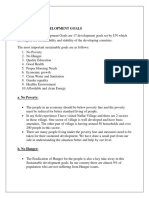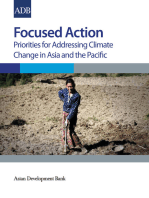The Concept of Sustainability
The Concept of Sustainability
Uploaded by
meutia intenCopyright:
Available Formats
The Concept of Sustainability
The Concept of Sustainability
Uploaded by
meutia intenOriginal Title
Copyright
Available Formats
Share this document
Did you find this document useful?
Is this content inappropriate?
Copyright:
Available Formats
The Concept of Sustainability
The Concept of Sustainability
Uploaded by
meutia intenCopyright:
Available Formats
THE CONCEPT OF SUSTAINABILITY: A CRITICAL APPROACH
Lynton K. Caldwell"
Although expressed in different ways, the goal of sustainability has most often
been the physical preservation of human societies and their cultures, institutions, social
orders and regimes. Cultural factors psychological, behavioral, and institutional have
influenced the ways in which humans understand and implement their economic and
environmental affairs and the need for sanative sustainable goals and practices. In the
modern world (e.g. since AD 1600) science has been a powerful cognitive influence on
perceptions of the environment. The consequences have been contradictory. Science
perceived as a servant and generator of technological innovation has led to notable
improvements in human life, but has also strongly reinforced the concept of "conquest
of nature", which too often has resulted in degradation of the natural environment
through exploitation by misapplied technologies. Science perceived as teacher opens the
way to understanding how the world of nature works, but has been less successful in
explaining human behavior. The sustainability of human society in the future depends
upon the ability and willingness of humans to order their behavior and institutions toward
maintaining ecological integrity in human relationships with earth. To this end, an
informed and rational concept of sustainability needs to be internalized in the ethos and
ethics of human society and applied critically to concepts of growth, development, and
the environment.
Ambiguity of the term "sustainability" allows for numerous and differing
interpretations. (Brown, et al. 1987). Without an understanding of its several meanings,
their differences and implications, the word risks becoming vacuous. During the latter
years of the twentieth century the concept of sustainability has been linked to another
ambiguous term- "development". What development means is best defined by what is
done in its name. Most often "development" in the socio-political context, implies
economic growth. Although there are attributions to physiological, cultural or ethical
"development- the term most frequently implies "growth" - another concept of many
meanings, e.g., material, qualitative, economic, exponential, intellectual, cyclical, self-
renewing, malignant, experiential. In-so-far as development implies - even requires -
some form or forms of continuing growth, the concept of sustainability becomes relevant.
For example if socio-ecological growth depends upon continuous functioning of the life
supporting systems of the natural environment- air, water, soil, and living organisms-
then the concepts of growth and development require the modifier of sustainability. But
"School of Public and Environmental Affairs, Indiana University, Bloomington, IN
47405.
J. Lemons et al. (eds.), Ecological Sustainability and Integrity, 1-15.
@ 1998 Kluwer Academic Publishers.
2 L.K. CALDWELL
where the relevant parameters of life on earth are finite, not all forms of growth are
indefinitely sustainable.
In the absence of realistic achievable goals, the concept of sustainability offers
the prospect of a continuing expansion of present economic and technological systems
without serious regard to ultimate limitations, to the quality of life, or to the costs of
maintenance. The World Commission on Environment and Development ( 1987) declared
"a sustainable society to be one that meets the needs of the present without compromising
the ability of future generations to meet their own needs." But who defines needs?
Donella Meadows (1992) defines "a sustainable society as one that can persist over
generations, one that is far-seeing enough, flexible enough, and wise enough not to
undermine either its physical or its social systems of support." But there appears to be
a conceptual problem following from these definitions. Each conceptualizes a sustainable
society as having the characteristics of a steady or homeostatic state. Yet each definition
implies and would seem to require a degree of foresight, coherence, and steadiness that
is not generally characteristic of advanced developing societies today. Can modern
society become sustainable?
1. Problems of Definition
Standing alone, unmodified, sustainabilityhas little meaning. When sustainability
is linked to development, the meaning is modified because development implies action
of some sort, and hence change. It appears, therefore, that sustainable development
means sustaining a process, not a condition. Yet in some contexts "sustainability" is
invoked to preserve a relative status quo or steady state condition - for example, of
ancient forests, top soil, or endangered species. The concept of sustainability is thus as
much preventative as conserving. There are limits to status quo sustainability just as
there are limits to growth. Even the stars age and die, but new stars are born and the
cosmos is sustained. On earth, the quality and tempo of change are the logical foci of
the sustainability concept.
In a world ever changing, even under natural circumstances, sustainability
implies resistant action and the capacity for renewal not stasis. For example, in status
quo environmental circumstances, sustainability signifies preservation of sanative
conditions, self-correction, and prevention of institutional decay. In a sustainable
developing living environment, sustainability is sought to direct the course of events so
that the quality of life, if not improved, will at least not be diminished. Sustainability in
a steady state, when achieved, might be less difficult to maintain than where the goal is
sustaining perpetual material growth in as much as the steady state (whatever its level of
quality) may be achievable through reactive maintenance (i.e., it is homeostatic) whereas
exponential growth cannot go on forever. If quality of life is a goal, this may require
undoing the damaging effects of past development. Public policy for sustainability, even
when corrective, is directed toward future plans, projects, objectives and ambitions. But
in a complex, dynamic world, outcomes can seldom be certain. Contention may
therefore arise over the amount and kind of action that is desirable or sustainable, for
how long, and to what presumed effect.
You might also like
- EDTM 312 NotasDocument93 pagesEDTM 312 NotasNERIEN COETZEENo ratings yet
- Sustainable DevelopmentDocument20 pagesSustainable Developmentridhamsharma2512No ratings yet
- Bhopal Development Plan 2031 VOL2Document149 pagesBhopal Development Plan 2031 VOL2ARSHI PARASHAR0% (2)
- Report MT New Diamond - CompressedDocument21 pagesReport MT New Diamond - CompressedAshen KularathnaNo ratings yet
- Sustainalytics ESG Ratings Methodology AbstractDocument15 pagesSustainalytics ESG Ratings Methodology Abstractmeutia intenNo ratings yet
- CBM Culture, Role of EducationDocument10 pagesCBM Culture, Role of Educationkousar razzaqNo ratings yet
- Essay 800 WordsDocument2 pagesEssay 800 WordsJo Traven AzueloNo ratings yet
- Nature and the Marketplace: Capturing The Value Of Ecosystem ServicesFrom EverandNature and the Marketplace: Capturing The Value Of Ecosystem ServicesRating: 2 out of 5 stars2/5 (1)
- Introduction & Preparation APES 2021-2022Document5 pagesIntroduction & Preparation APES 2021-2022johnosborneNo ratings yet
- Lecture Unit 1: 1. Sustainability & Sustainable DevelopmentDocument12 pagesLecture Unit 1: 1. Sustainability & Sustainable DevelopmentkronixserrNo ratings yet
- Concept of Sustainable DevelopmentDocument80 pagesConcept of Sustainable Developmenthermionejame123100% (1)
- Sustainable Development - Handouts (Mids)Document16 pagesSustainable Development - Handouts (Mids)touseefwahabNo ratings yet
- Summit Brochure (SOUTHEAST NIGERIAN YOUTH ENVIRONMENTAL AND CLIMATE CONSERVATION SUMMIT 2021)Document6 pagesSummit Brochure (SOUTHEAST NIGERIAN YOUTH ENVIRONMENTAL AND CLIMATE CONSERVATION SUMMIT 2021)Global ECC Initiative100% (1)
- ASSIGNMENT-1 SDG-3 & Its Performance in PakistanDocument5 pagesASSIGNMENT-1 SDG-3 & Its Performance in PakistanTameem Nadeem100% (1)
- Social Safety Nets in BangladeshDocument14 pagesSocial Safety Nets in Bangladeshsazzadur rahman shuvoNo ratings yet
- Sustainable Development TimelineDocument36 pagesSustainable Development TimelineZaheenNo ratings yet
- Concepts of Sustainable DevelopmentDocument4 pagesConcepts of Sustainable Developmentapi-27499979100% (1)
- Education For Sustainable Development SourcebookDocument51 pagesEducation For Sustainable Development SourcebookAndrew Yan100% (1)
- What Is Sustainable Development and Why Is It ImportantDocument13 pagesWhat Is Sustainable Development and Why Is It ImportanttraxisxdNo ratings yet
- Can't Afford To Wait: Why Disaster Risk Reduction and Climate Change Adaptation Plans in Asia Are Still Failing Millions of PeopleDocument18 pagesCan't Afford To Wait: Why Disaster Risk Reduction and Climate Change Adaptation Plans in Asia Are Still Failing Millions of PeopleOxfamNo ratings yet
- Getting A Grip On Climate Change in The PhilippinesDocument5 pagesGetting A Grip On Climate Change in The Philippinesluz adolfoNo ratings yet
- Sustainable DevelopmentDocument11 pagesSustainable DevelopmentA.Yazhini AmizhdhiniNo ratings yet
- Sustainable Development GoalsDocument5 pagesSustainable Development GoalsPavan Kalyan KolaNo ratings yet
- Agriculture and Climate Change. Challenges and Opportunities at The Global and Local LevelDocument56 pagesAgriculture and Climate Change. Challenges and Opportunities at The Global and Local LevelJorge Samaniego EguigurenNo ratings yet
- The 17 Sustainable Development Goals (SDGS)Document19 pagesThe 17 Sustainable Development Goals (SDGS)Stephen Gabriel TitoNo ratings yet
- Education For Sustainable Development Guidance - 1616774629Document51 pagesEducation For Sustainable Development Guidance - 1616774629Nico MorarNo ratings yet
- Sustainable DevelopmentDocument22 pagesSustainable DevelopmentjerofireNo ratings yet
- Course Guide: RICS School of Built EnvironmentDocument11 pagesCourse Guide: RICS School of Built EnvironmentAjit SinghNo ratings yet
- Sustainable Development Issuesand StrategiesDocument9 pagesSustainable Development Issuesand Strategiescharvi shinyNo ratings yet
- Opening Speech CzechDocument1 pageOpening Speech CzechSabina CarliNo ratings yet
- Sustainable Development, Society, Economy and Environment Using SETS & VENN DiagramDocument2 pagesSustainable Development, Society, Economy and Environment Using SETS & VENN DiagramAarohiNo ratings yet
- The Concept of Sustainable DevelopmentDocument8 pagesThe Concept of Sustainable DevelopmentMarilyn Basa0% (1)
- Class 10 Project On Sustainable Development 2Document21 pagesClass 10 Project On Sustainable Development 2sonupurve169No ratings yet
- 7 Sustainable Development PowerpointDocument15 pages7 Sustainable Development PowerpointDivyanshu Negi100% (1)
- EVS PojectDocument20 pagesEVS PojectParth MittalNo ratings yet
- Climate Smart Agriculture CSADocument3 pagesClimate Smart Agriculture CSAsantosh8289No ratings yet
- Examining Gender Responsive Implementation of National Climate Change PoliciesDocument186 pagesExamining Gender Responsive Implementation of National Climate Change PoliciesCattleya PenalosaNo ratings yet
- Global Health and Human DevelopmentDocument27 pagesGlobal Health and Human Developmentapi-311270394No ratings yet
- Vulnerability: What Makes People Vulnerable?Document2 pagesVulnerability: What Makes People Vulnerable?TRISTANE ERIC SUMANDENo ratings yet
- Zim 169511Document176 pagesZim 169511Newton MutasaNo ratings yet
- Environmental PPT FINALDocument7 pagesEnvironmental PPT FINALAdamNo ratings yet
- Natural Resources and DevelopmentDocument10 pagesNatural Resources and DevelopmentEdward KahwaiNo ratings yet
- Noheli Felicien ASSIGNMENTBEM4101Introduction To Environmental EducationDocument3 pagesNoheli Felicien ASSIGNMENTBEM4101Introduction To Environmental EducationIshimwe100% (1)
- Sustainable Development ProjectDocument9 pagesSustainable Development Projectreadingchallenge jnvsklmNo ratings yet
- Resources, Environment, and Economic DevelopmentDocument42 pagesResources, Environment, and Economic DevelopmentBation, Lorjie B.No ratings yet
- Climate ChangeDocument5 pagesClimate ChangeAnas MuhammadNo ratings yet
- Blding CollapseDocument9 pagesBlding CollapseChristbet2002No ratings yet
- Sustainability, Sustainable Engineering, & Implementing Sustainable EngineeringDocument35 pagesSustainability, Sustainable Engineering, & Implementing Sustainable Engineeringankush100% (1)
- Applied Geography: A B C D eDocument13 pagesApplied Geography: A B C D ebagasNo ratings yet
- Education For Sustainable DevelopmentDocument10 pagesEducation For Sustainable DevelopmentIAN MICHAEL BAANGNo ratings yet
- Environment Communication PaperDocument7 pagesEnvironment Communication PaperAshleyYoungNo ratings yet
- Corporate Environmental Responsibility Transitional and EvolvingDocument20 pagesCorporate Environmental Responsibility Transitional and EvolvingPronoy RoyNo ratings yet
- Interactive Effect of Caste and Disability: An AnalysisDocument8 pagesInteractive Effect of Caste and Disability: An AnalysisIJELS Research JournalNo ratings yet
- Raj Vardhan Agarwal Environmental Studies and Law 2 ProjectDocument12 pagesRaj Vardhan Agarwal Environmental Studies and Law 2 Projectraj vardhan agarwalNo ratings yet
- Say No To PlasticDocument28 pagesSay No To Plasticpavithra nirmalaNo ratings yet
- Global Status of NGOsDocument23 pagesGlobal Status of NGOsPranay Krishnan100% (1)
- Green Economy: Making It WorkDocument36 pagesGreen Economy: Making It WorkUnited Nations Environment Programme100% (1)
- Final Campaign Book-1Document61 pagesFinal Campaign Book-1api-279519863No ratings yet
- Sustainable Development-Chapter 6Document25 pagesSustainable Development-Chapter 6Lesley GallaNo ratings yet
- Dudley Seers The MeaningDocument28 pagesDudley Seers The MeaningCristian ColbuNo ratings yet
- Sustainable Development GoalsDocument69 pagesSustainable Development GoalsArlie Gelua Fresnido100% (1)
- Training Africa's Youth in Waste Management and Climate Change: A Textbook for the Youth in Africa's Primary and Junior Secondary SchoolsFrom EverandTraining Africa's Youth in Waste Management and Climate Change: A Textbook for the Youth in Africa's Primary and Junior Secondary SchoolsNo ratings yet
- Focused Action: Priorities for Addressing Climate Change in Asia and the PacificFrom EverandFocused Action: Priorities for Addressing Climate Change in Asia and the PacificNo ratings yet
- Environmental and Social Disclosures: Link With Corporate Financial PerformanceDocument42 pagesEnvironmental and Social Disclosures: Link With Corporate Financial Performancemeutia intenNo ratings yet
- Differentiating Stakeholder TheoriesDocument13 pagesDifferentiating Stakeholder Theoriesmeutia intenNo ratings yet
- Understanding Communication of Sustainability ReportingDocument25 pagesUnderstanding Communication of Sustainability Reportingmeutia intenNo ratings yet
- Environmental Legitimacy, Green Innovation, and Corporate Carbon DisclosureDocument17 pagesEnvironmental Legitimacy, Green Innovation, and Corporate Carbon Disclosuremeutia intenNo ratings yet
- Critical Perspectives On Accounting: Lois S. Mahoney, Linda Thorne, Lianna Cecil, William LagoreDocument10 pagesCritical Perspectives On Accounting: Lois S. Mahoney, Linda Thorne, Lianna Cecil, William Lagoremeutia intenNo ratings yet
- Dissecting The Implementation of Musharaka in Islamic Banking in IndonesiaDocument11 pagesDissecting The Implementation of Musharaka in Islamic Banking in Indonesiameutia intenNo ratings yet
- IntroductionDocument3 pagesIntroductionSamantha Vhiel VicenteNo ratings yet
- (Chapter 1) : Introduction To The Core Concept of SustainabilityDocument15 pages(Chapter 1) : Introduction To The Core Concept of SustainabilityShah AasifNo ratings yet
- The Delhi Jal Board (DJB) : Seeing Beyond The PlannedDocument15 pagesThe Delhi Jal Board (DJB) : Seeing Beyond The Plannedmantoo kumarNo ratings yet
- Lesson Plan 3 (Science 9)Document2 pagesLesson Plan 3 (Science 9)Jeferson OrañoNo ratings yet
- Economic Evaluation of Urban Heritage An Inclusive App 2015 Journal of CultDocument7 pagesEconomic Evaluation of Urban Heritage An Inclusive App 2015 Journal of CultNiclas HellNo ratings yet
- La Estrategia Australiana para Conservar La Biodiversidad en Un Programa Proyectado Al 2030Document2 pagesLa Estrategia Australiana para Conservar La Biodiversidad en Un Programa Proyectado Al 2030Juan MeraNo ratings yet
- READING-AND-WRITING-Q4 Module-3Document8 pagesREADING-AND-WRITING-Q4 Module-3Red ViperNo ratings yet
- 6393 - FOLUR - ID - AWP Development Workshop - 25 April 2022Document35 pages6393 - FOLUR - ID - AWP Development Workshop - 25 April 2022Indah PasimuraNo ratings yet
- Structure and Functions of Ecosystem: Srivatsan 19BFS053Document11 pagesStructure and Functions of Ecosystem: Srivatsan 19BFS05319BFS053 Srivatsan SridharNo ratings yet
- Applied Geography: María Fernanda Tapia-Armijos, Jürgen Homeier, David Draper MuntDocument11 pagesApplied Geography: María Fernanda Tapia-Armijos, Jürgen Homeier, David Draper Muntmonica oviedoNo ratings yet
- Lit17 EV G07 U2 UT P2 TESTDocument5 pagesLit17 EV G07 U2 UT P2 TESTMaimona KhanNo ratings yet
- Lab 5-Soil, Sedimentary Rocks, Structures, and Environments Lab ReportDocument7 pagesLab 5-Soil, Sedimentary Rocks, Structures, and Environments Lab ReportGil GameshNo ratings yet
- ECON6003 2020-21 Problem Set Answers and InstructionsDocument4 pagesECON6003 2020-21 Problem Set Answers and InstructionsBen OusoNo ratings yet
- Irrigation Planning and Command Area Development: 5.1 GeneralDocument14 pagesIrrigation Planning and Command Area Development: 5.1 Generalwakil ahmadNo ratings yet
- Gelec1 Ws 1.1 Module 1Document5 pagesGelec1 Ws 1.1 Module 1Joel SalalilaNo ratings yet
- Year 6 Layers of The Earth ProjectDocument2 pagesYear 6 Layers of The Earth ProjectSyifa Nailufar RohmanNo ratings yet
- Irrigation Department: Government of KeralaDocument2 pagesIrrigation Department: Government of KeralashivanandarcotNo ratings yet
- 831-Article Text-2026-1-10-20230130Document6 pages831-Article Text-2026-1-10-20230130yulyasiregarNo ratings yet
- Far Eastern UniversityDocument22 pagesFar Eastern UniversityAllyson Megan RuzNo ratings yet
- Btech Ce 7 Sem Water Resources Rce702 2021Document2 pagesBtech Ce 7 Sem Water Resources Rce702 2021Saket RusiaNo ratings yet
- De Thi Minh Hoa Mon Tieng Anh Ky Thi Tot Nghiep THPT Nam 2024Document4 pagesDe Thi Minh Hoa Mon Tieng Anh Ky Thi Tot Nghiep THPT Nam 2024Hoàng - Tuấn officialNo ratings yet
- Trường Thpt Chuyên Long An Đề Thi Thử 01 Kỳ Thi Chọn Đội Tuyển Học Sinh Giỏi Quốc Gia Thpt Năm 2021 Môn: Tiếng AnhDocument15 pagesTrường Thpt Chuyên Long An Đề Thi Thử 01 Kỳ Thi Chọn Đội Tuyển Học Sinh Giỏi Quốc Gia Thpt Năm 2021 Môn: Tiếng AnhThe EndNo ratings yet
- Literary Criticism ActivityDocument3 pagesLiterary Criticism ActivityJunrey De La CruzNo ratings yet
- QuestionnaireDocument2 pagesQuestionnaireNova Jane EdradNo ratings yet
- Public Speaking Term PaperDocument7 pagesPublic Speaking Term Paperafdtrqaau100% (1)
- UntitledDocument1 pageUntitledGetu NigussieNo ratings yet
- Tiss511 PoeDocument13 pagesTiss511 PoexvlbansNo ratings yet
































































































